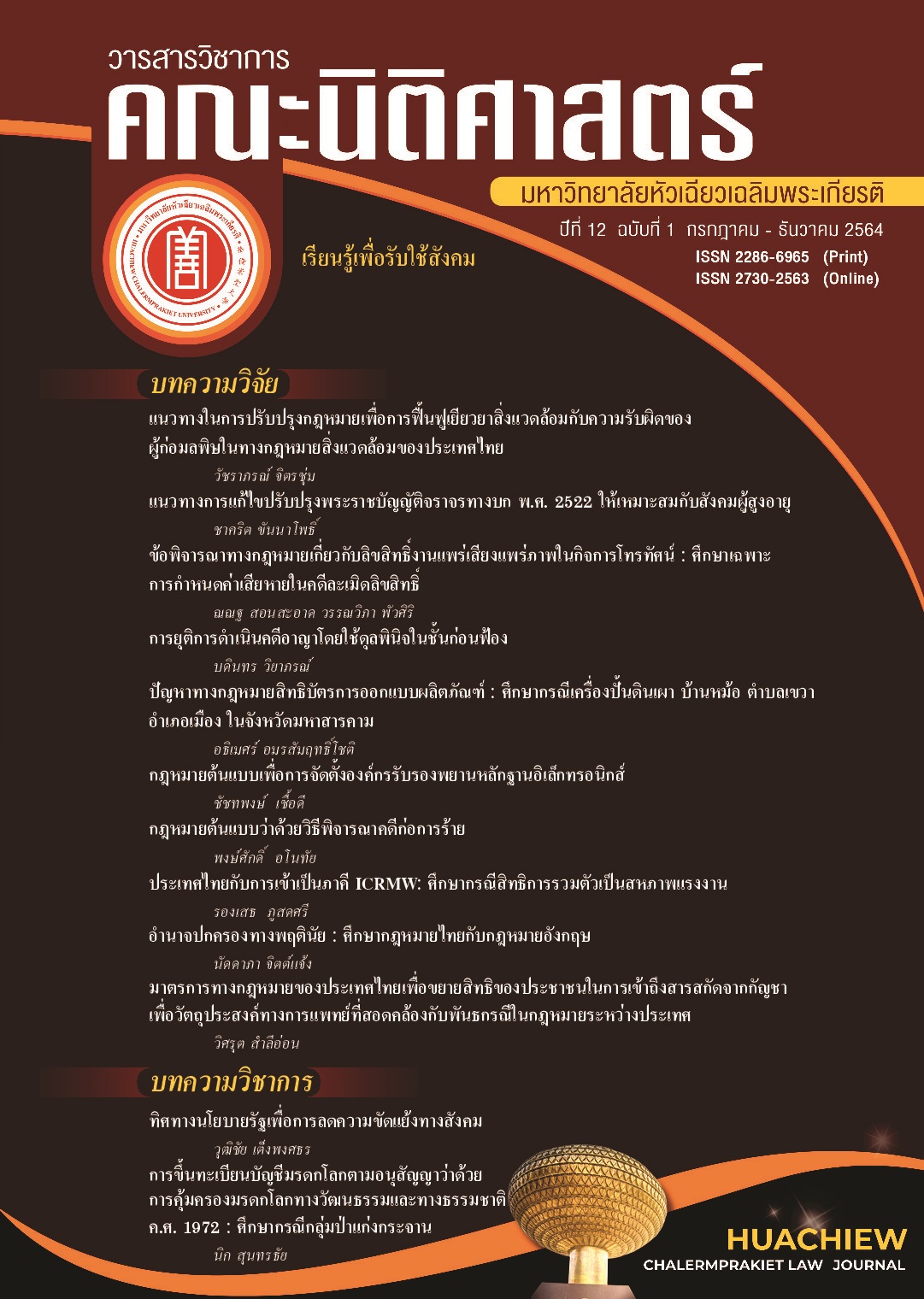THAILAND’S ACCESSION TO ICRMW: A STUDY RIGHT OF GATHERING AS LABOR UNION
Keywords:
ICRMW, International Convention on the Rights of All Migrants Workers and Members of Their Families, Right of gathering as Labor UnionAbstract
International migrant workers have an impact on the countries involved, whether they are origin countries, transit countries and destination countries. In fact, it is found that migrant workers are often taken advantage of by the employment country. Therefore, the International Organization has established an international convention to set labor standards. And to protect migrant workers in accordance with human rights principles
International Convention on the Protection of the Rights of All Migrant Workers and Members of Their Families (ICRMW) is an instrument organized by the United Nations to certify migrant rights specified in International Bill of Rights (Universal Declaration of Human Rights and International Covenant on Political and Civil Rights and Economic and Social and Cultural Rights). The Convention covers the two main ILO conventions, Migration for Employment Convention (ILO: C-97) and Migrant Workers (Supplementary Provisions) Convention (ILO: C-143).
This study found that obtaining rights in trade unions depends on the legal status of migrant workers. The conditions for forming a trade union under the ICRMW differ from the ILO: C-87, regardless of the legal status of migrant workers.
Being a member of the ICRMW has a positive effect on Thailand. This demonstrates the recognition of human rights of migrant workers, while also encouraging migrant workers to become legal workers in order to have the right to establish and take a position in legal unions. However, if Thailand wishes to become an ICRMW party, it should review the internal rules regarding the right to unionization in accordance with the Convention.
References
กองบริหารข้อมูลตลาดแรงงาน กรมการจัดหางาน กระทรวงแรงงาน. “กระแสการเคลื่อนย้ายแรงงานข้ามชาติ.” ปีที่ 10 ฉบับที่ 9 วารสารตลาดแรงงานภาคกลาง. (2561): 8.
นพนิธิ สุริยะ. “คณะกรรมการสิทธิมนุษยชนแห่งชาติ.” วารสารนิติศาสตร์. เล่ม 4. ปีที่ 29. (ธันวาคม 2542): 541-542.
พงษ์เทพ สันติกุล. “สิทธิมนุษยชน สิทธิพลเมือง และสิทธิทางสังคม.” วารสารการเมือง การบริหาร และกฎหมาย, ฉบับที่ 1 ปีที่ 11. (2562): 44-46.
Beth Lyon. “The ICRMW and The US: Substantive Overlap, Political Gap,” Cornell Law School research paper18-17. (2017): 280.
Erica Usher. “Essentials of migration management: a guide for policy makers and practitioners, Developing migration policy.” 2 International Organization for Migration (IOM). (2004): 152.
Everett S.Lee, “A Theory of Migrations.” 3 Demography 1. (March 1966): 49.
Isabelle Slinckx. “Migrants’ rights in UN human rights conventions.” Migrantion and Human Rights: The United Nations Convention on Migrant Workers’ Rights. ed. Ryszard Cholewinski, Palu de Guchteneire, and Antoine Pecoud. pp. 132-136. New York: Cambridge University press, 2009.
Patrick Taran. “Globalization, Migration and Labour: Imperatives for a Rights based Policy.” 2 Journal of Globalization Studies. (May 2011): 58-77.
Rysard Cholewinski. “Miigration for Employment.” Issues in International Migration Law, ed. Sir Richard Plender. P.55. Boston: Brill Nijhoff and Hotei, 2015.
Downloads
Published
How to Cite
Issue
Section
License
Copyright (c) 2021 Huachiew Chalermprakiet Law Journal

This work is licensed under a Creative Commons Attribution-NonCommercial-NoDerivatives 4.0 International License.
บทความหรือข้อความคิดเห็นใด ๆ ที่ปรากฏในวารสารฉบับนี้เป็นวรรณกรรมของผู้เขียนโดยเฉพาะ คณะนิติศาสตร์มหาวิทยาลัยหัวเฉียวเฉลิมพระเกียรติ และกองบรรณาธิการไม่มีส่วนรับผิดชอบหรือไม่จำเป็นต้องเห็นด้วยกับข้อคิดเห็นนั้น แต่ประการใด








